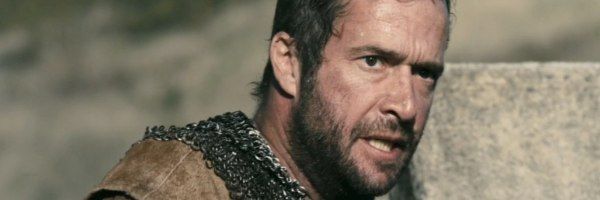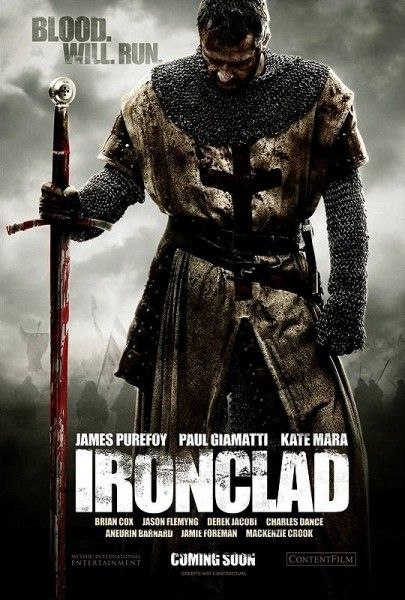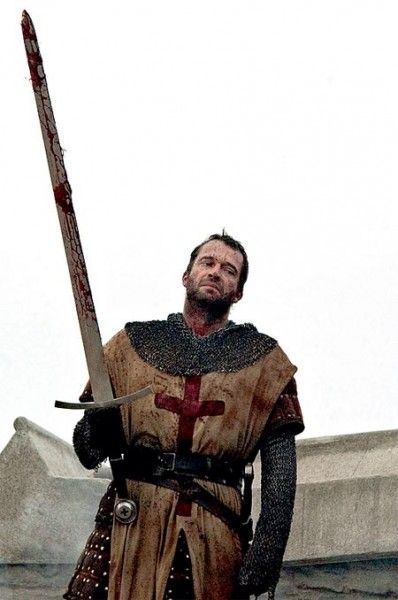James Purefoy is an incredibly versatile actor whose career has spanned film, television and theatre, and who cannot be pinned down in any one type of role. He had six years of leading roles with some of the UK’s most prestigious theatres, starred as Mark Antony in HBO’s epic drama series Rome, has had memorable roles in Resident Evil and A Knight’s Tale, played the title character in Solomon Kane, about a mercenary who owes his soul to the devil and redeems himself by fighting evil, and has done such television series as The Philanthropist for NBC, Camelot for Starz and Injustice for ITV1. Now, he can be seen as a Templar Knight whose soul is wracked with guilt over the atrocities he has committed during the Crusades, in the ultra-violent medieval action-thriller Ironclad.
During a recent exclusive phone interview, the complex and unpredictable actor talked about what drew him to the story and character in Ironclad, the research he did into individuals who are so devout, the importance of depicting violence in a real and honest manner, and what sets this film apart from others of its type. Purefoy also talked about his role in John Carter as Kantos Kan, the Captain of the Xavarian, working with Ciarán Hinds for the third time, and how, even though his character is not in this film much, he has the understanding that it is meant to expand in two more possible films. Check out what he had to say after the jump:
Here’s the film synopsis:
Traveling back to the dark, brutal past of 13-century England, Ironclad plunges us headlong into one of the most violent, pivotal moments in English medieval history, when a few good men fought against insurmountable odds to defend their country from a megalomaniac, blood-drunk king. Torn from the pages of history, the devastating battle for the castle of Rochester is a true story of honor, action and excitement. It’s 1215 and King John (Paul Giamatti) has been forced to sign the Magna Carta, a document that will ensure the freedom of men and form the basis of common law in England. Furious at having been forced to sign it, King John raises a vicious mercenary army and begins a rampage across the country to regain total power. But, as the King’s army is on the brink of reaching London and taking back control of the country, one last castle stands between him and inevitable victory. Gathered together by Baron Albany (Brian Cox), a small band of rebel warriors unite inside Rochester, intent on holding off King John until reinforcements arrive – a Templar Knight (James Purefoy) whose soul is wracked with guilt over the atrocities he has committed during the Crusades, along with his burgeoning feelings for Isabel (Kate Mara), the beautiful lady of the castle and lonely wife of the aging Reginald de Cornhill (Derek Jacobi).
Question: How did Ironclad originally come about for you, and what was it that drew you to this story and character?
JAMES PUREFOY: I was doing a movie called Solomon Kane, which is another big sword movie, and the director of that was contacted by Jonathan English and I guess he said, “Can he handle a sword?” And, I guess Mike Bassett, the director of Solomon Kane, went, “Yeah, he can handle a sword.” Then, I went over to L.A. and, while I was in L.A., I sat with Johnny English and he showed me the script, and I just loved the story. I thought the story was a sensational little tale. It was something I didn’t know anything about. I thought it was really interesting. And then, he started talking about the other actors that were going to be in it, and all those actors changed over a period of time. It took a couple of years for this to get together, but I was in there, right at the beginning. The other actors really were just stupendously good, and they were all people that I’d either worked with, I met or I knew, and I felt very safe with them. I knew that we would be able to do a very good ensemble piece, which is the kind of thing I like doing best.
Did you do any research for this role and this period in history, or does putting on the costumes and getting onto the sets help take care of those things?
PUREFOY: No, I had to do a lot of research because I needed to know how a Knight Templar worked, so I looked a lot into the Knights Templar, the whole movement and the kind of men they were. Essentially, they were warrior monks. They were incredibly devout priests who were also mind-bogglingly good with a sword. They were brought into the order when they were about 12 years old, and then they were trained over years and years and years, and around 17 or 18, they took three vows – one of chastity, one of poverty and one of absolute, no-questions-asked obedience to the Church. Whatever they were asked to do for the Church, they had to do. Obviously, that meant that they were often involved in very serious violence and very serious atrocities, often in the Middle East, in the first Crusades, and they did it without question. That drew me to it. I found the idea fascinating.
One of the things I like about doing historical films is drawing the line between now and then. Have we changed that much, over the last thousand years? If you look around us, there are an awful lot of men out there, and women, but mostly men, who believe that they have got a fast-track path to Heaven, if they do the things that they believe God is telling them to do, and I don’t just mean Islamic people. I mean Fundamentalist Christians. There are many hundreds of Christians who have committed appalling acts of violence in the name of God, whether it be blowing up an abortion clinic, or whatever. There are many different strands of religious people who have a fundamental belief that they’ve got a get-out-of-jail-free card because they’re doing what they’re told by God or by their Church, and I find that an interesting area to occupy. In the film, my character becomes increasingly more and more doubtful about the levels of violence that he’s committed in the name of God.
When you make a film that’s this violent and bloody, is it important to you that it’s real and honest to the time, as opposed to being over-glorified?
PUREFOY: Yeah, it is. I like it like that. I think it is important and crucial. The first time I saw this film, I was really shocked by the violence in it, but I didn’t find it sexy or cool or glorified, in any way. I just found it real. It is sickeningly real, in many ways, and that’s the way violence really should be. Violence is a very ugly thing. Violence is often so casual on film, and made to look so cool and so sexy, but violence is a repulsive, repugnant act that human beings inflict on each other. It shouldn’t seem to be cool and sexy, ever really. That’s one of the reasons I liked it.
As an actor, what is it like for you to go from doing something as real and gritty as Ironclad to doing something like John Carter where most of it is CG with a green screen? Do you prefer doing roles that are more gritty, or is it fun for you to also get to rely totally on your imagination?
PUREFOY: It is fun. Obviously, one has to look at things tonally. As an actor, I can sit here espousing off about how violence should be real, but in John Carter there are also sword fights. It’s a different movie. It’s a difficult area because actors constantly have to do different levels of violence in different movies, and you end up having to justify being glamorous and violent in John Carter, in a way that you just go, “Well, the violence doesn’t really have much consequence in this film, either on the people it is inflicted upon or on you, as a character.” So, it’s a tricky area for me to occupy, to tell you the truth.
Who are you playing in John Carter and how does he fit into the story?
PUREFOY: The character’s name is Kantos Kan, and he is an admiral of a big ship, called the Xavarian. He’s very close to Tardos Mors, who’s played by Ciarán Hinds, who is the Emperor or King of Helium. He’s a very cheeky, mischievous soldier/airman. He’s not in this film very much, in the first one. I think a lot of the characters in the first John Carter are established, but with the knowledge that they’re going to be bigger in the next two episodes of it. So, it’s a lovely character. He’s just very charming. He’s not frightened of getting involved in very sticky situations with John Carter. There’s a certain bravado about him. He’s a bit Errol Flynn-esque. He has a great lust for life and he’s a very positive character, in the film.
Did you have any scenes with Polly Walker, or did you just both happen to be in the film together?
PUREFOY: No, we just happened to both be in the film. A lot of my scenes are with Ciarán Hinds. This is my third job with Ciarán Hinds, where I’ve played his right-hand man. I know the back of his head terribly well now.
You had such good chemistry with Polly Walker when you worked together on Rome.
PUREFOY: Yeah, I know. We didn’t get to do anything. In fact, we didn’t even see each other on John Carter.
Would you like to work with her again, at some point?
PUREFOY: Yeah, I love Polly. I’m very, very fond of Polly, and I think she’s a really terrific actress. We did have a really good time on Rome.
With your previous history with HBO, and a lot of your fans really hoping for it, would you ever consider doing a role on Game of Thrones?
PUREFOY: If it was the right role on Game of Thrones, definitely. Of course! It’s a terrific series. It’s a great series of books. I love HBO. I’m on record saying that HBO is the best television company in the world, and I believe they are. I think they absolutely understand how to make television that is really, really vital and interesting and visceral, and all the things that television really should be. I’m a big fan of HBO.
You’ve done a wide variety of roles that definitely keep people guessing about who you are, as an actor. Has that been intentional, on your part?
PUREFOY: It’s been entirely intentional, absolutely. I think it’s vital. And also, it’s important for me because it’s very easy to get bored. I’m a little bit ADD and I like to change things a lot. It’s really important. Although I’ve done a lot of sword movies – I guess that’s the kind of thing that I get known for – having said that, from where I am, I’ve done an awful lot of different kinds of things as well. They may not be as popular or as widely seen, but from where I am, they’re still things that require as much attention and as much commitment as the things that I am known for. I spend the time doing them, and whether people watch them or not is of little consequence to me. I enjoy playing those parts because I like doing things that are very wildly different. I find that the meat and vegetables of being an actor is doing things that are completely different, all the time. That’s the thing that excites me. But then, I think I come from a theatrical tradition where, if you look at the great theatrical actors of the British theatre, they took enormous pride in being wildly different from one role to the next. That’s the tradition I come from, so it’s hardly surprising, really.
Even with the variety of work that you’ve done, are there still roles that you haven’t gotten to do yet, that you’d love the chance to do?
PUREFOY: I just take it as it comes, in truth, and see what happens. What I went into the acting business for was to have a certain amount of chaos in my life. I don’t know what I’m doing next. It’s exciting like that. That’s the way I like it. I couldn’t do the same job for 30 years. That would make me want to kill myself. Other people do it and they’re very happy doing it, but for me, that’s not what I want. I like changing things, all the time. I like changing who I am. It gives me a chance to be people I will never be, in real life. That’s one of the reasons a lot of actors go into the business. For a short period of time, you get to be other people who you can only fantasize about being, by and large.
Why should people see Ironclad and what sets it apart from other films and TV shows of this era?
PUREFOY: If you’ve ever wondered – and I don’t know how many people have wondered – what it’s like to be right slap-bang in the middle of a medieval siege, and what that might be like, and how visceral and terrifying that might be, than this is definitely the film for you. No punches are pulled, it’s a really good story, and you’ll come out of the end of it knowing exactly what it would have been like to be in the middle of a medieval siege.



